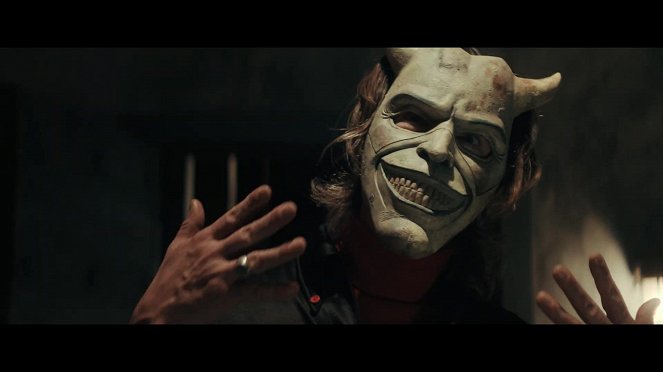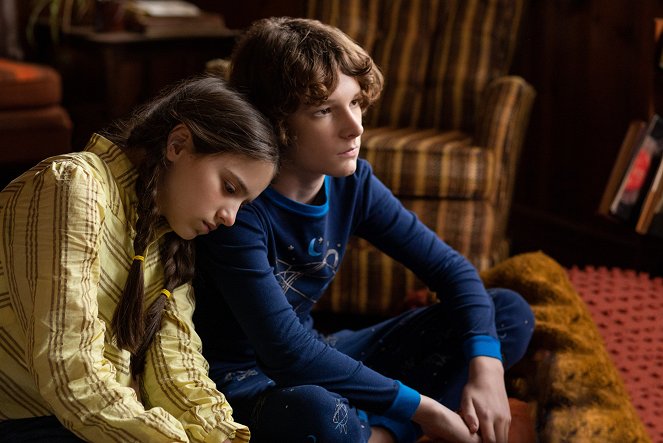Directed by:
Scott DerricksonCinematography:
Brett JutkiewiczComposer:
Mark KorvenCast:
Mason Thames, Madeleine McGraw, Ethan Hawke, Jeremy Davies, E. Roger Mitchell, James Ransone, Gina Jun, Banks Repeta, Megan Petersen, Kellan Rhude (more)VOD (4)
Plots(1)
Finney Shaw, a shy but clever 13-year-old boy, is abducted by a sadistic killer and trapped in a soundproof basement where screaming is of little use. When a disconnected phone on the wall begins to ring, Finney discovers that he can hear the voices of the killer’s previous victims. And they are dead set on making sure that what happened to them doesn’t happen to Finney. (Universal Pictures US)
(more)Videos (5)
Reviews (9)
Like the source material, which is not one of the best pieces in the collection (in fact, I didn't remember the story at all, unlike others), the film version of The Black Phone is not a groundbreaking work. Actually, it’s not even horror, rather a thriller with supernatural elements. Is it a shame? Quite the contrary! The film is so well shot and acted (the child actors, the brother and sister, are perfect) that it is strongest in those scenes where nothing supernatural happens and it’s simply about people. The supernatural is important, but in the exact spirit of Hill, it's not really explained properly and serves more as a deus ex machina, which was fine with me. The excellent period atmosphere and the superb villain took care of the rest.
()
Scott Derrickson has got the touch like few others. It's shot in exactly that unsettling thriller tone, plus it has top-notch sound design. Narratively, it's maddeningly unbelievable (from the kid fights to the phone gags to the final showdown), but overall it holds together by the skin of its teeth in some weird way. It's not much, but for unpretentious one-time viewing it's doable. [60%]
()
For a film that was supposed to be one of the highlights of this year's horror season, The Black Phone is terribly basic. There's really nothing extra beyond what the synopsis says and what the trailer showed. I kept hoping that Derrickson and Hill held some sort of ace up their sleeve, but alas. It's well made, it has quality actors and likeable characters, a creepy bad guy, but what's the point when it's more period atmospheric than scary, the rules of how the supernatural works float in a vacuum, the finale lasts about a minute, and the only minor plot surprise elicits raised eyebrows rather than appreciative shock at the screenwriter's abilities. A watchable genre film, but we should demand more from Scott Derrickson's cinematic horror.
()
He's a bad boy, that Ethan, but let's be honest, without his meaty glam rocker, this would hardly be a slightly scarier episode of a cartoon. There are a couple of ideas in there, but they are not the most polished I’ve ever seen. Derrickson surprises us a bit through the fluctuation of tone, and the goofball elements are really out of place. Overall, I wasn’t really blown away by it. Deliver Us From Evil may have been corny as hell, but it had a dense atmosphere. This film oscillates between a cute Stranger Things ballad and a feeble genre hybrid. I am not going to give him any credit next time.
()
Hill's collection Bobby Conroy Comes Back from the Dead is pleasantly old-fashioned, surprisingly often discontented, and chilling in several places. Overall, however, its title promises something different, specifically a compilation of small unpleasant horrors that an uninformed reader would expect from King's son. The Black Telephone, on the other hand, is one of the weaker pieces in the book. It is a short suggestive story full of only partially fulfilled potential, with two successful parts, and what harms it the most is the fact that it takes place in one location. Promising a film adaptation seemed like a very bold idea to me, but Scott Derrickson and C. Robert Cargill surpassed themselves. They dug deep into the story, where in the original only names jumped out, they added significant plot lines, and they turned Gwen, played by the incredible Madeleine McGraw, into an equal main protagonist. And yet I'm not sure about the way they explain key events. In many places, they only mention one sentence (the mother's death, the father's motivation, conditions in Finney's prison, the killer's convenient blindness towards broken or tidy things, the willingness of the police to listen to unorthodox solutions), but they rarely expand on it. Of course, I was able to read between the lines in this case, but it's a solution in the style of "If I see it there, then it's there". But if it was really just viewer theories and lucky writing coincidences, it would be dead ends or even plot holes, and that would be a shame in this case. So I lean towards the version that everything is perfectly thought out and that's exactly how I should feel – torn.
()



Ads